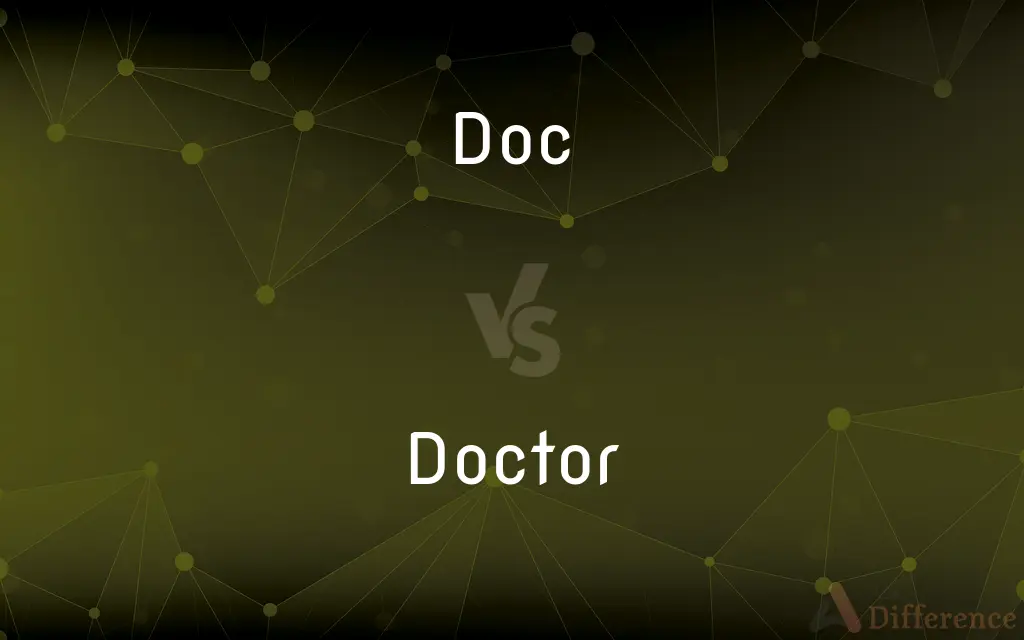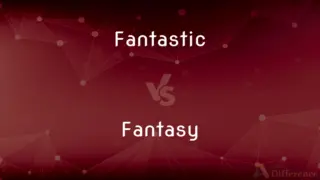Doc vs. Doctor — What's the Difference?
Edited by Tayyaba Rehman — By Fiza Rafique — Updated on April 17, 2024
"Doc" is a colloquial abbreviation for "doctor," often used informally, whereas "doctor" is the formal title for medical professionals or PhD holders.

Difference Between Doc and Doctor
Table of Contents
ADVERTISEMENT
Key Differences
"Doc" is commonly used as an informal, affectionate, or casual term when addressing or referring to a medical professional, while "doctor" is the formal term used in official contexts and documents.
In everyday language, people might refer to their physician as "doc" to express familiarity or comfort, whereas "doctor" conveys a sense of professionalism and formality.
"Doc" can also appear in various cultural contexts, such as movies and literature, to denote a friendly or approachable character, on the other hand, "doctor" is used to emphasize the qualifications and expertise of the individual.
In terms of perception, "doc" might not always be associated with someone holding a medical degree; it can also be used metaphorically or humorously in different settings, whereas "doctor" specifically identifies someone as a medical doctor or a holder of a doctoral degree.
While "doc" is rarely used in academic or legal settings, "doctor" is preferred in academic titles, professional certifications, and legal documents to denote a precise level of education or accreditation.
ADVERTISEMENT
Comparison Chart
Formality
Informal
Formal
Usage Contexts
Casual conversations, cultural media
Official documents, academic titles
Connotation
Friendly, approachable
Professional, authoritative
Required Qualifications
None specifically
Medical degree or PhD
Perception in Professional Settings
Generally not used
Commonly used
Compare with Definitions
Doc
Casual reference in various media.
The character Doc Brown from Back to the Future is iconic.
Doctor
Indicates a high level of expertise or specialization.
Consult a doctor for accurate diagnosis.
Doc
Informal term for someone regarded as capable of fixing or repairing.
Call the doc of computers; mine crashed again.
Doctor
A licensed medical practitioner.
The doctor will see you now.
Doc
Slang for an expert in any area.
She’s the real doc when it comes to baking.
Doctor
Used formally in healthcare settings.
Doctor Smith is the leading surgeon in this hospital.
Doc
Used metaphorically to describe someone providing advice.
He’s the doc of love problems among us.
Doctor
Title for academic or professional distinction.
Doctor Jones teaches medieval literature at the university.
Doc
A nickname for a doctor.
I’m just going for a quick check-up with the doc.
Doctor
Holder of the highest university degree.
She defended her thesis to become a doctor in chemistry.
Doc
A person with an advanced degree licensed to practice in a medical field, such as a physician, dentist, or veterinarian.
Doctor
A person who is licensed to practice medicine and has trained at a school of medicine or a school of osteopathic medicine; a physician.
Doc
(informal) A doctor.
Doctor
Any of certain other healthcare professionals, such as a dentist, optometrist, chiropractor, podiatrist, or veterinarian.
Doc
A document, especially (in professional jargon) a piece of technical documentation or legal evidence.
Doctor
A practitioner of alternative medicine or folk medicine who does not have traditional medical credentials.
Doc
(informal) A documentary.
Doctor
A person who has earned the highest academic degree, usually a PhD, awarded by a college or university in a specified discipline.
Doc
Clipping of doctorate
Doctor
A person awarded an honorary degree by a college or university.
Doc
A licensed medical practitioner;
I felt so bad I went to see my doctor
Doctor
Abbr. Dr. Used as a title and form of address for a person holding the degree of doctor.
Doc
The United States federal department that promotes and administers domestic and foreign trade (including management of the census and the patent office); created in 1913
Doctor
Roman Catholic Church An eminent theologian.
Doctor
A rig or device contrived for remedying an emergency situation or for doing a special task.
Doctor
(Informal) To give medical treatment to
"[He] does more than practice medicine. He doctors people. There's a difference" (Charles Kuralt).
Doctor
To repair, especially in a makeshift manner; rig.
Doctor
To falsify or change in such a way as to make favorable to oneself
Doctored the evidence.
Doctor
To add ingredients so as to improve or conceal the taste, appearance, or quality of
Doctor the soup with a dash of sherry.
Doctor
To alter or modify for a specific end
Doctored my standard speech for the small-town audience.
Doctor
(Baseball) To deface or apply a substance to (the ball) in violation of the rules in order to throw a pitch with extraordinary movement
Was ejected because he doctored the ball with a piece of sandpaper.
Doctor
To practice medicine.
Doctor
A physician; a member of the medical profession; one who is trained and licensed to heal the sick or injured. The final examination and qualification may award a doctor degree in which case the post-nominal letters are D.O., DPM, M.D., DMD, DDS, in the US or MBBS in the UK.
If you still feel unwell tomorrow, see your doctor.
Doctor
A person who has attained a doctorate, such as a Ph.D. or Th.D. or one of many other terminal degrees conferred by a college or university.
Doctor
A veterinarian; a medical practitioner who treats non-human animals.
Doctor
A nickname for a person who has special knowledge or talents to manipulate or arrange transactions.
Doctor
(obsolete) A teacher; one skilled in a profession or a branch of knowledge; a learned man.
Doctor
(dated) Any mechanical contrivance intended to remedy a difficulty or serve some purpose in an exigency.
The doctor of a calico-printing machine, which is a knife to remove superfluous colouring matter
The doctor, or auxiliary engine, also called "donkey engine"
Doctor
A fish, the friar skate.
Doctor
A ship's cook.
Doctor
(transitive) To act as a medical doctor to.
Her children doctored her back to health.
Doctor
To act as a medical doctor.
Doctor
(transitive) To make (someone) into an (academic) doctor; to confer a doctorate upon.
Doctor
(transitive) To physically alter (medically or surgically) a living being in order to change growth or behavior.
They doctored their apple trees by vigorous pruning, and now the dwarfed trees are easier to pick.
We may legally doctor a pet to reduce its libido.
Doctor
(transitive) To genetically alter an extant species.
Mendel's discoveries showed how the evolution of a species may be doctored.
Doctor
(transitive) To alter or make obscure, as with the intention to deceive, especially a document.
To doctor the signature of an instrument with intent to defraud is an example of forgery.
Doctor
(transitive) To adulterate, drug, or poison (drink).
Doctor
To take medicine.
Doctor
A teacher; one skilled in a profession, or branch of knowledge; a learned man.
One of the doctors of Italy, Nicholas Macciavel.
Doctor
An academical title, originally meaning a man so well versed in his department as to be qualified to teach it. Hence: One who has taken the highest degree conferred by a university or college, or has received a diploma of the highest degree; as, a doctor of divinity, of law, of medicine, of music, or of philosophy. Such diplomas may confer an honorary title only.
Doctor
One duly licensed to practice medicine; a member of the medical profession; a physician.
By medicine life may be prolonged, yet deathWill seize the doctor too.
Doctor
Any mechanical contrivance intended to remedy a difficulty or serve some purpose in an exigency; as, the doctor of a calico-printing machine, which is a knife to remove superfluous coloring matter; the doctor, or auxiliary engine, called also donkey engine.
Doctor
The friar skate.
Doctor
To treat as a physician does; to apply remedies to; to repair; as, to doctor a sick man or a broken cart.
Doctor
To confer a doctorate upon; to make a doctor.
Doctor
To tamper with and arrange for one's own purposes; to falsify; to adulterate; as, to doctor election returns; to doctor whisky.
Doctor
To practice physic.
Doctor
A licensed medical practitioner;
I felt so bad I went to see my doctor
Doctor
(Roman Catholic Church) a title conferred on 33 saints who distinguished themselves through the othodoxy of their theological teaching;
The Doctors of the Church greatly influenced Christian thought down to the late Middle Ages
Doctor
Children take the roles of doctor or patient or nurse and pretend they are at the doctor's office;
The children explored each other's bodies by playing the game of doctor
Doctor
A person who holds Ph.D. degree from an academic institution;
She is a doctor of philosophy in physics
Doctor
Alter and make impure, as with the intention to deceive;
Sophisticate rose water with geraniol
Doctor
Give medical treatment to
Doctor
Restore by replacing a part or putting together what is torn or broken;
She repaired her TV set
Repair my shoes please
Common Curiosities
Is "doc" a recognized title?
No, "doc" is not a recognized academic or professional title; it's an informal or colloquial term.
How do children typically refer to medical doctors?
Children often use "doctor" or a specific nickname like "doc" when referring to medical professionals, depending on their familiarity.
Do all doctors have medical degrees?
Not all doctors have medical degrees; some hold PhDs or other types of doctoral degrees in various fields.
In what media is "doc" frequently used?
"Doc" is frequently used in movies, television shows, and books to create a friendly or approachable character who is a doctor.
Can "doctor" be abbreviated in any professional settings?
"Doctor" is sometimes abbreviated as "Dr." in both written and spoken forms, maintaining its professional and formal status.
Can "doctor" be used in informal settings?
Yes, "doctor" can be used informally, but it inherently carries a formal tone due to its association with professional and academic qualifications.
What is the origin of the term "doctor"?
The term "doctor" originates from the Latin "docere," meaning "to teach," reflecting its original association with teaching and learned individuals.
What should I consider before calling a professional "doc"?
Consider the relationship and setting; "doc" is best used in casual or familiar contexts, whereas "doctor" is safer in formal or first-time interactions.
How is "doctor" perceived internationally?
Internationally, "doctor" is widely respected and recognized as a title for both medical practitioners and holders of doctoral degrees.
Is it appropriate to use "doc" in a professional email?
It is generally not appropriate to use "doc" in professional emails; "doctor" should be used to maintain formality.
How do other languages translate "doctor"?
Many languages have a formal term equivalent to "doctor," often derived from Latin, like "doktor" in many Slavic languages and "docteur" in French.
What are some common misunderstandings about the term "doctor"?
A common misunderstanding is that "doctor" only refers to medical doctors, whereas it can also denote a person who has achieved a doctorate in any academic field.
Can "doc" be used as a term of endearment?
Yes, "doc" is often used as a term of endearment or familiarity, particularly in long-term patient-doctor relationships or in casual, friendly exchanges.
Are there any professions where "doc" is commonly used outside of medicine?
"Doc" is sometimes used colloquially in other settings, like in mechanics or technology, to denote expertise, but this is informal and metaphorical.
When did "doc" start being used as a nickname for doctors?
The use of "doc" as a nickname for doctors dates back to at least the 19th century in colloquial American English.
Share Your Discovery

Previous Comparison
Fantastic vs. Fantasy
Next Comparison
Gather vs. CollectAuthor Spotlight
Written by
Fiza RafiqueFiza Rafique is a skilled content writer at AskDifference.com, where she meticulously refines and enhances written pieces. Drawing from her vast editorial expertise, Fiza ensures clarity, accuracy, and precision in every article. Passionate about language, she continually seeks to elevate the quality of content for readers worldwide.
Edited by
Tayyaba RehmanTayyaba Rehman is a distinguished writer, currently serving as a primary contributor to askdifference.com. As a researcher in semantics and etymology, Tayyaba's passion for the complexity of languages and their distinctions has found a perfect home on the platform. Tayyaba delves into the intricacies of language, distinguishing between commonly confused words and phrases, thereby providing clarity for readers worldwide.














































